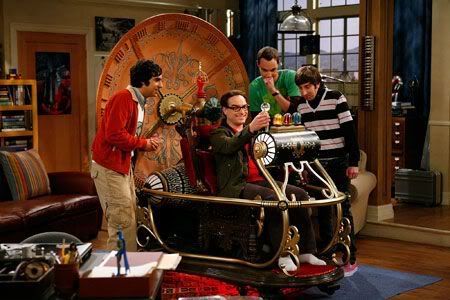© 1895 H.G. Wells
108 pages
I was not expecting The Time Machine to be such a short read. The Great Illustrated Classics treatment of it was the first bit of science fiction I ever read, and I remember it being a fairly thick read and was surprised to find that my library's only copy of the work was bound in a collection with The Invisible Man. Much of that book from my childhood sticks with me: the Time-Traveler staring at two wilted flowers, the titular machine that looked more like an amusement park ride than a time-traveling device, the way it made me want to find out what "mutton" tasted like, since the Time Traveler found it so appealing when he returns from his first trip -- and the haunting image of him staring at a bloated sun that filled the sky on a cold and dying Earth.
You may have surmised at this point that The Time Machine is a novella about a man who goes time-traveling. It begins at his home in England as he talks with his friends about the reality of four dimensions and the fact that time is as real as width or depth. (I found this very interesting when I was a child, given that science classes at the elementary level consisted of memorizing definitions of things.) He then states that he has found a way to move forward through time, and demonstrates with a little model of a time machine to prove this to his skeptical friends, most of whom are known only from their occupations -- as is the Time Traveler. Most of the story is told from his point of view: a week after he demonstrates his little model, he returns from a more extended time-traveling trip, most of which he spends in the far future.
He spends most of his time in the year 802,701, in which he discovers (in England) two races of people whom he believes are the descendants of humanity, the first being a childlike race of people living in vast communal structures who spend their time eating fruit, singing songs, and dances. At first the Traveler believes these people to be the fulfillment of human evolution -- they have completely conquered Nature, and now can enjoy the fruits of their labor. The problem with this, as the Traveler soon discovers, is that these people (the Eloi) are not enjoying the fruits of their labor. They do nothing other than sleep, eat, and enjoy other sensual pleasures. They don't grow food or make clothing -- so where are their generous supplies of fruit and simple tunics coming from? Our Traveler finds this out when he discovers the second race of men, the Morlocks: they live underground, fiddle with machines, and prey on the Eloi like humans treat cattle.
The Traveler's explanation for the evolution of the Eloi and Morlocks is grounded in then-contemporary social conditions and historical materialism: he believes that the Eloi and the Morlocks are the ancestors of the bourgeaouise and working class respectively. I assume that since the laborers were treated like animals, they became so. Our Traveler is quick to admit that this explanation, however plausible, could be wrong -- just as his initial thoughts about the Eloi were. As he explores the landscape -- eventually venturing into the Morlock underworld -- he befriends an Eloi named Weena. She seemed to be less present in the actual novella than in the children's book I read,but perhaps as a child I simply gave her more attention. Eventually the Traveler leaves the world of 802,701 to witness Earth's end, and quickly returns to his present to tell his friends of his story. The novel has a slight twist ending.
What is remarkable for a book written in 1895 is how utterly readable this novella is: Victorian language can be a bit dense at times, but this was easy to read as a magazine article. The story has its charm as well.
Lead picture is from The Big Bang Theory.

I like the picture! You make every book sound fascinating. Are you going to be a teacher? Just wondering because you would be a great one!
ReplyDeleteThe Time Machine is a great book and, as is usually the case, much better than the film. HG Wells *rocks* IMHO.
ReplyDeletePom Pom: I want to be a public librarian -- I obviously like books and I want a career that allows me to play a role in and interact with the community that I live in.
ReplyDelete@CyberKitten: Ever read his history/future history books? I'm thinking of trying his "The Shape of Things to Come".
SC said: Ever read his history/future history books? I'm thinking of trying his "The Shape of Things to Come".
ReplyDeleteYes.
http://cyberkittenspot.blogspot.com/2008/06/just-finished-reading-shape-of-things.html